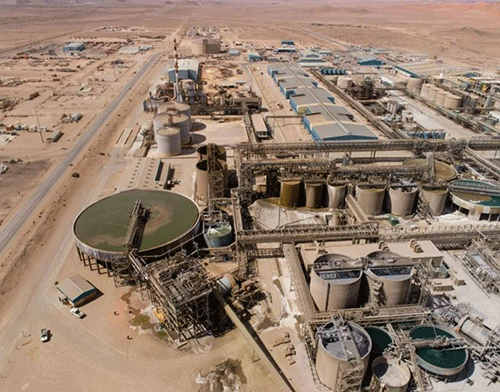The Skorpion Zinc mine and refinery in southern Namibia is currently under care and maintenance, which is a mining terms used to describe processes and conditions when a mine is closed, but where there is potential to recommence operations at a later date.
This has forced Skorpion’s owners, Vedanta Zinc International, to review its long-term strategy in Namibia.
According to the mine’s care and maintenance manager, Lance Williamson, both the mine and refinery are not currently operational. “Feasibility studies on the conversion of the Skorpion Zinc refinery to cater for both oxide and sulphide ore types have been completed and some preliminary early works (area preparation i.e. water lines etc) have been installed. Vedanta continues to engage both local and international stakeholders to find a favourable solution to its power requirements,” Williamson told New Era. He added that the mine has been in operation since 2003 and went into care and maintenance in May 2020.
“However, should the Skorpion Zinc Refinery Conversion project be completed and ore reserves secured, our studies show that the refinery will be able to run for an additional 15 years from the re-commissioning date,” said Williamson. Skorpion Zinc is currently designed with a capacity to produce 150ktpa of Special High Grade (SHG) zinc. The zinc mine was acquired by parent company Vedanta Resources Plc from Anglo American in 2010, having been in operation since
2003. However, the mine was placed under care and maintenance in 2020, owing to depleted ore reserve in the open pit. Williamson explained that currently a team of approximately 40 employees look after the mine and its equipment while the company works on plans for the conversion of the current refinery and sourcing of feed ore from both green and brownfield sources near the mine. Last year Vedanta planned to invest some N$6.5 billion into upgrading the refinery at the zinc mine. Known as the Namzinc Refinery Conversion project, this conversion was to enable Skorpion Zinc Mine to treat a number of sulphides and oxides to produce the refined metal. Once modified the refinery was meant to facilitate the processing of zinc sulphide concentrate along with oxide ore until the end of the mine’s lifespan, after which zinc sulphide would be treated until approximately 2032. The mine was expected to source the zinc sulphide concentrate from Black Mountain and Gamsberg in the Northern Cape, South Africa, while new sulphide deposits discovered in southern Namibia and the possibility of importing concentrates via the Lüderitz port made the project viable. In 2021, the mine also revised a feasibility study conducted in 2015 when the lifespan of the mine would have ended and the mine closed in 2019 due to the depletion of the existing oxide resources.
This, however, resulted in significant challenges due to geotechnical instabilities in the open pit that resulted in intermittent stoppages and delays which extended the project timeline and significantly eroded project value. Meanwhile, Vedanta’s
N$6.5-billion investment was supposed to go towards critical additions into managing infrastructure such as bulk handling and storage of zinc sulphide concentrate, the construction of a roasting circuit with gas-cleaning plant and gas recovery acid plant, including the installation and integration of a new calcine leach circuit to facilitate the sulphide conversion part.



